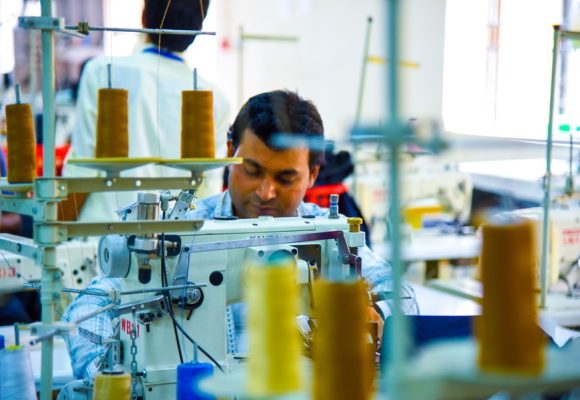LPP has become one of the signatories of the Pakistan Accord

As of early 2023, Accord – an international agreement seeking to improve safety and working conditions in garment factories – has expanded its scope to Pakistan. LPP is the only Polish company to join signatories of the Accord, which covers a total of over 500 factories, alongside other apparel and textile companies. Pakistan is another country, after Bangladesh, where the joint initiative by trade unions representing factory workers and apparel companies can help significantly improve working conditions and safety.
The Pakistan Accord on Health and Safety in the Textile and Garment Industry came into force on 1 January this year and will remain in effect until the end of 2025. Similarly to the Accord’s operation in Bangladesh, the Pakistan Accord is a legally binding agreement between the trade unions – IndustriALL and Uni Global Union – and apparel brands and retailers. Its primary goal is to control working and safety conditions in supply chains involving suppliers of garments produced in Pakistan. The scope of the agreement has also been expanded in this country to include factories producing fabrics and knitwear, home textiles, and accessories.
– We want to cooperate with factories that provide their employees with safe and decent working conditions, and thanks to the Accord we have the opportunity to verify them independently and to take a systemic, fully transparent approach to the corrective programmes implemented – comments Dorota Jankowska-Tomków, procurement and ESG director at LPP.
– Considering the experiences gathered over the last decade and the way the garment industry in Bangladesh is changing, largely thanks to the Accord, we want to be a committed member of this initiative, which is expanding to include yet another country. The decision to join Accord Pakistan has been a no-brainer for us as an element of cooperation with local suppliers. By joining forces with other companies, we have the opportunity to create modern standards for the operation of factories and extend protection to a growing group of employees – added Dorota Jankowska-Tomków.
The initiative will cover over 500 factories in Sindh and Punjab provinces, where most of Pakistan’s annual textile exports are produced. The brands that are signatories to the agreement source over USD 2.6bn worth of apparel and textiles in Pakistan. Targeted activities will be carried out in three key areas – the first is a programme of inspection and implementation of countermeasures, which will ensure inspection of the safety of building structures, heating systems, fire safety and electrical safety. The agreement provides for setting up a health and safety committee and launching an occupational safety training programme. Another target pillar of Accord in Pakistan will be the establishment of a mechanism for employee complaints on health and safety issues. This process will take place with full confidentiality and independence from third parties.
– Giving factory workers a voice in health and safety issues is one of the key elements that constitute Accord’s effectiveness. Our role as signatories to the agreement is to provide them with financial and systemic support in identifying and mitigating risks. Openness to cooperation on the part of factory owners is extremely important in this process. From our observations, it appears that Pakistani suppliers are eager to act, as they are aware of the changes taking place in the garment industry. Many Pakistani textile and apparel manufacturers have made significant investments in fire and building safety in recent years. We also see that issues related to ensuring high labour and safety standards are increasingly a competitive advantage for the country on the international stage, and are becoming an asset for suppliers when negotiating with companies like ours – comments Justyna Weryk, LPP’s sustainability manager.
By 2022, LPP has earmarked over PLN 40m to improve working conditions in factories. In addition to the activities carried out under the Accord, the company has continuously controlled labour and safety standards through audits conducted by its own inspectors, as well as external auditors. Among other things, the process of complying with the LPP Code of Conduct has been verified. The latter document, which sets out the Polish manufacturer’s standards for suppliers, emphasizes requirements regarding wage policies, the prohibition of underage employment, voluntary labour, freedom of association and health and safety issues, among others.
Cooperation between unions and apparel companies under the Accord began in 2013. Over the span of 10 years, the Accord has played a key role in reforming the fashion industry. By identifying hazards and malfunctions in factories and implementing corrective programmes, factories in Bangladesh have become safer places to work. In an effort to expand the scale of the transformation of the garment industry and extend protection to a larger group of workers, for several months the International Accord Steering Committee has been analysing the situation of countries where garment production is an important part of their national economies, while due to the economic conditions of these countries the implementation of safety measures and improvement of working conditions seems crucial. The Pakistani Accord, concluded in December 2022, is the first direction of expansion beyond Bangladesh.

______________________________
LPP is a Polish family business and one of the fastest growing clothing companies in the region of Central and Eastern Europe. For 30 years, it has been successfully operating in Poland and abroad, offering its collections in such prestigious capitals as London, Helsinki or Tel Aviv. LPP manages five fashion brands: Reserved, Cropp, House, Mohito, and Sinsay, whose offer is available today in stationary and online stores in nearly 40 markets worldwide. The company has a chain of over 1800 stores with the total area of 1.5 million m2 and distributes clothing and accessories to three continents every year. LPP also plays an important role as it employs over 24 thousand people in its offices and sales structures in Poland, Europe, Asia, and Africa. The company is listed on the Warsaw Stock Exchange in the WIG20 index and belongs to the prestigious MSCI Poland index.

